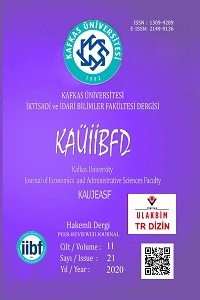ÖRGÜTSEL ÇALIŞMALARIN AHLAKİ DOĞASINI ŞEKİLLENDİRMEDE MİHENK TAŞI: ALASDAİR MACINTYRE’NİN ERDEM ETİĞİ PERSPEKTİFİ
Abstract
Bu çalışmada ahlak alanında filozof olan Alasdair MacIntyre’nin iş etiği alanında yansıması olan erdem etiği perspektifinin temel kavramlarının tartışılması amaçlanmıştır. MacIntyre’nin örgütsel çalışmalardaki gelişim seyrinin izi takip edilmiş, MacIntyre’nin “erdemler-iyiler-pratik-kurum” şeması aktör, kurumsallaşma modu ve çevre bağlamında ele alınmıştır. Böylece, niçin bazı örgütlerin ahlaki pratiklerini koruyabildiği, erdemlerini geliştirebildiği ve ahlaki aktör rolünü harekete geçirebildiği daha iyi bir şekilde anlaşılabilir. Bunun yanında, örgütlerin erdemlilik haritasının ve bu haritada hangi erdemlerin olabileceğinin değerlendirmesi yapılmıştır. Bu doğrultuda, örgütsel çalışmalarla örgütsel etik çalışmalarının birbirinden kopukluğunun üstesinden gelinmesinde MacIntyre’nin erdem etiği perspektifi önerilmiştir.
References
- Alzola, M., Hennig, A., & Romar, E. (2019). Thematic Symposium Editorial: Virtue Ethics Between East and West. Journal of Business Ethics, 1-13.
- Beadle, R. (2013). Managerial work in a practice-embodying institution: The role of calling, the virtue of constancy. Journal of Business Ethics, 113(4), 679-690.
- Beadle, R. (2015). MacIntyre's influence on business ethics. In A. Sison, G. Beabout, & I. Ferrero (Eds.), Handbook of virtue ethics in business and management: 1–9. New York: Springer.
- Beadle, R., & Moore, G. (2006). MacIntyre on virtue and organization. Organization Studies, 27(3), 323-340.
- Beadle, R., & Moore, G. (2011). MacIntyre, neo-Aristotelianism and organization theory. Research in the Sociology of Organizations, 32, 85-121.
- Chu, I., & Moore, G. (2019). From Harmony to Conflict: MacIntyrean Virtue Ethics in a Confucian Tradition. Journal of Business Ethics, 1-19.
- Crockett, C. (2008). MacIntyre: From transliteration to translation. Philosophy of Management, 7(1), 45-66.
- Dawson, D. (2009). Conflicting stories of virtue in UK healthcare: Bringing together organisational studies and ethics. Business Ethics: A European Review, 18(2), 95-109.
- Dobson, J. (2009). Alasdair MacIntyre’s Aristotelian business ethics: A critique. Journal of Business Ethics, 86(1), 43-50.
- Fernando, M., & Moore, G. (2015). MacIntyrean virtue ethics in business: A cross-cultural comparison. Journal of Business Ethics, 132(1), 185-202.
- Ferrero, I., & Sison, A. J. G. (2014). A quantitative analysis of authors, schools and themes in virtue ethics articles in business ethics and management journals (1980–2011). Business Ethics: A European Review, 23(4), 375-400.
- Ghoshal, S. (2005). Bad management theories are destroying good management practices. Academy of Management learning & education, 4(1), 75-91.
- Keskin, H., Akgün, A. E., & Koçoğlu, İ. (2016). Örgüt teorisi. Nobel Dağıtım.
- Knight, K. (1994). A MacIntyre Reader. Polity Press, Cambridge.
- MacIntyre, A. (2007). After Virtue (London, Duckworth).
- MacIntyre, A. (1994). A Partial Response to My Critics” in After MacIntyre. John Horton and Susan.
- MacIntyre, A. (1988). Whose justice? Which rationality? London: Duckworth.
- MacIntyre, A. (2013). Replies. Revue Internationale de Philosophie, 67(2), 201–220.
- Meyer, M. (2018). The evolution and challenges of the concept of organizational virtuousness in positive organizational scholarship. Journal of Business Ethics, 153(1), 245-264.
- Miettinen, R., Samra-Fredericks, D., & Yanow, D. (2009). Re-turn to practice: An introductory essay. Organization Studies, 30(12), 1309-1327.
- Moore, G. (2002). On the implications of the practice–institution distinction: MacIntyre and the application of modern virtue ethics to business. Business Ethics Quarterly, 12(1), 19-32.
- Moore, G. (2005). Corporate character: Modern virtue ethics and the virtuous corporation. Business Ethics Quarterly, 15(4), 659-685.
- Moore, G. (2008). Re-imagining the morality of management: A modern virtue ethics approach. Business Ethics Quarterly, 18(4), 483-511.
- Moore, G. (2012). Virtue in business: Alliance boots and an empirical exploration of MacIntyre’s conceptual framework. Organization Studies, 33(3), 363-387.
- Moore, G. (2015). Corporate character, corporate virtues. Business Ethics: A European Review, 24, S99-S114.
- Moore, G., & Beadle, R. (2006). In search of organizational virtue in business: Agents, goods, practices, institutions and environments. Organization Studies, 27(3), 369-389.
- Moore, G., & Grandy, G. (2017). Bringing morality back in: Institutional theory and MacIntyre. Journal of Management Inquiry, 26(2), 146-164.
- Nielsen, R.P. 2003. ‘Organization theory and ethics: varieties and dynamics of constrained optimization’. In Tsoukas, H. and Knudson, C. (Eds.), Organization Theory: 476–501. Oxford: Oxford University Press.
- Nicholson, H., Beadle, R., & Slack, R. (2019). Corporate Philanthropy as a Context for Moral Agency, a MacIntyrean Enquiry. Journal of Business Ethics, 1-15.
- Pianezzi, D., Nørreklit, H., & Cinquini, L. (2019). Academia After Virtue? An Inquiry into the Moral Character (s) of Academics. Journal of Business Ethics, 1-18.
- Robson, A. (2015). Constancy and integrity:(un) measurable virtues? Business Ethics: A European Review, 24, S115-S129.
- Sinnicks, M. (2018). Leadership after virtue: MacIntyre’s critique of management reconsidered. Journal of Business Ethics, 147(4), 735-746.
- Sinnicks, M. (2019). Moral education at work: On the scope of MacIntyre’s concept of a practice. Journal of Business Ethics, 159(1), 105-118.
- Tsoukas, H. (2018). Strategy and virtue: Developing strategy-as-practice through virtue ethics. Strategic Organization, 16(3), 323-351.
- Van De Ven, B. (2011). Banking after the Crisis. Ethical Perspectives, 18(4), 541.
- Wang, Y., Cheney, G., & Roper, J. (2016). Virtue ethics and the practice–institution schema: An ethical case of excellent business practices. Journal of Business Ethics, 138(1), 67-77.
- Weaver, G. R. (2006). Virtue in organizations: Moral identity as a foundation for moral agency. Organization Studies, 27(3), 341-368.
- West, A. (2018a). After virtue and accounting ethics. Journal of Business Ethics, 148(1), 21-36.
- West, A. (2018b). Multinational tax avoidance: Virtue ethics and the role of accountants. Journal of Business Ethics, 153(4), 1143-1156.
- Wilcox, T. (2012). Human resource management in a compartmentalized world: whither moral agency? Journal of Business Ethics, 111(1), 85-96.
Details
| Primary Language | Turkish |
|---|---|
| Journal Section | Articles |
| Authors | |
| Publication Date | June 30, 2020 |
| Acceptance Date | May 12, 2020 |
| Published in Issue | Year 2020 Volume: 11 Issue: 21 |
KAUJEASF is the corporate journal of Kafkas University, Faculty of Economics and Administrative Sciences Journal Publishing.
KAUJEASF has been included in Web of Science since 2022 and started to be indexed in the Emerging Sources Citation Index (ESCI ), a Clarivate product.

